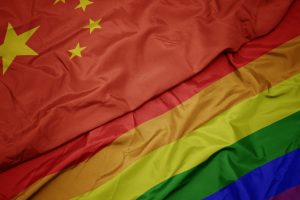The Beijing LGBT Center closed on May 15. With it went the empowering community events, safe space networking, workshops, and counseling that made the center so crucial and pioneering to the Chinese capital’s queer community, according to a prominent local LGBTQ organizer who goes by AJ.
“At least at the moment, there are no other such counseling alternatives for LGBTQ+ people,” said AJ (who asked not to give his real name, for fear of retribution from the authorities). “We have to go online now. I hope another organization can provide such help.”
The 15-year-old center’s post on Chinese social media app WeChat announcing the news read: “We very regretfully announce, due to forces beyond our control, the Beijing LGBT Center will stop operating today.”
None of the center’s staff contacted by The Diplomat responded to requests for comment. One former employee (who declined to comment on the record) posted publicly on a Western social media platform about the closure being an “end of an era” for LGBTQ civil activism in China, while admitting that many community members had long been bracing themselves for the shut down.
Indeed, Yale legal scholar and expert on LGBTQ rights in China Darius Longarino said the center’s closure is the latest in a wider crackdown marginalizing queer Chinese. When asked to weigh in, based on his legal expertise, about whether the shuttering was lawful, Longarino told The Diplomat, “I’m not exactly sure what form the pressure from the authorities took… I am not aware of – nor has anyone mentioned – a written order that cited legal authority for the closure. From the outside, it looks like the pressure that forced the closure was extralegal.”
Regardless, he added, “Practically speaking, the center has no legal recourse.”
Previous steps in the ongoing crackdown, in Longarino’s view, include China’s National Health Commission announcing in 2018 that its HIV prevention efforts include “guiding media and the internet to correctly propagandize sexual health, sexual orientation and sexual morality,” a ban on LGBTQ-related content (lambasted as “abnormal sexual relations”) in online videos, along with the closure of other organizations like ShanghaiPRIDE in 2020 and LGBT Rights Advocacy China in 2021.
“Since ShanghaiPRIDE ceased operations in 2020, we have received support from them [the Beijing LGBT Center] and now, as community leaders, we are extending our support to them as well,” said ShanghaiPRIDE co-founder Raymond Phang. He went on to describe how both organizations had long “fruitful” collaborations.
“The community that supported Beijing LGBT Center and relied on them all these years will definitely lose a home,” Phang added. “LGBTQ+ advocacy requires continuous work and this will disrupt the momentum and affect the progress.”
That progress included the mental health counseling that AJ mentioned, said Longarino, along with HIV testing and safe space events. Those events were not merely emotionally meaningful; they “built networks of LGBTQ-affirming professionals in the fields of psychology, health, business, and law who could support the community.”
On top of building such professional bonds, the center also forged much needed information networks with research and awareness campaigns that had seldom been seen before. That’s because the sensitivity of LGBTQ issues in China discourages most researchers from approaching the subject, said Longarino.
He added: “From the grassroots level to the national level, they were creating positive changes, and their efforts would even be covered in a positive light by English-language state media.”
That work helped the Beijing LBTQ Center “foster a sense of community and belonging for gender and sexual minorities in the country,” said Dr Hongwei Bao, an associate professor in Media Studies at the University of Nottingham and author of “Queer Media in China.”
According to Bao, the center “championed gender equality and sexual diversity crucial for the healthy development of Chinese society. Its closure leaves a huge void for China’s LGBTQ community and culture. LGBTQ people will feel even more unsupported and alienated.”
Bao’s friend and fellow activist Popo Fan is a film director whose acclaimed documentaries shed light on LGBTQ life in China. Fan declined to be interviewed for this article, but wrote on Facebook shortly after the closure: “I was involved from the beginning as a volunteer, director and then board member until 2020. This is not only a big loss for the LGBT culture and civil society in China, but also means many of the oppressed have missed their home.”
Bao furthered that point by telling The Diplomat: “The center’s closure signals the intensification of the Chinese government’s continuous crackdown on queer organizations, events and cultures. This is a heavy blow to China’s LGBTQ community, who have been struggling for recognition and survival. The closure also sends a chilling signal to other LGBTQ organizations and community spaces in the country.”
Despite grieving the loss, Chinese LGBTQ advocates remain determined. “We hope it won’t be long, and we hope they [the Beijing LGBT Center] will come back,” said Phang. In the meantime, he added, Beijing’s queer “community can self initiate events and create safe spaces to support each other. We also need new and more advocates to join the initiatives.”
But it won’t be easy, said AJ, both on a short-term practical level but also in terms of broader ramifications. “Not only here in Beijing, but around China it will be devastating news. The environment these days is not good, especially when it comes to funding,” he said.
Therefore, he and fellow activists and community members need to treat this as “a wakeup call and message for the community. That there are so many things we need to do. And we need to find another strategy to survive, and to find a new way to create help and build capacities for the future generations.”
AJ added: “The good thing is when something is gone something will always come up. Hopefully that happens soon so that the community has somewhere to go and has an organization they can trust.”

































